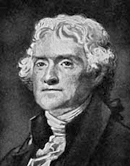
Return to U.S. Presidency - Index Page.
Return to U.S. Presidents' Biographies Page.
Born: 4/13/1743
Birthplace: Albemarle County, Va.
Thomas Jefferson was born on April 13 (April 2, old style), 1743, at Shadwell in Goochland (now Albemarle) County, Va. A William and Mary graduate, he studied law, but from the start showed an interest in science and philosophy. His literary skill and political clarity brought him to the forefront of the revolutionary movement in Virginia.
In 1779, he became governor, but constitutional limitations on his power, combined with his own lack of executive energy, caused an unsatisfactory administration, culminating in Jefferson's virtual abdication when the British invaded Virginia in 1781. He retired to his beautiful home at Monticello, Va., to his family. His wife, Martha Wayles Skelton, whom he married in 1772, died in 1782.
Jefferson's Notes on Virginia (1784–85) illustrate his many-faceted interests, his limitless intellectual curiosity, his deep faith in agrarian democracy. Sent to Congress in 1783, he helped lay down the decimal system and drafted basic reports on the organization of the western lands. In 1785 he was appointed minister to France, where the Anglo-Saxon liberalism he had drawn from John Locke, the British philosopher, was stimulated by contact with the thought that would soon ferment in the French Revolution. In 1789, Washington appointed him Secretary of State. While favoring the Constitution and a strengthened central government, Jefferson came to believe that Hamilton contemplated the establishment of a monarchy. Growing differences resulted in Jefferson's resignation on Dec. 31, 1793.
Elected vice president in 1796, Jefferson continued to serve as spiritual leader of the opposition to Federalism, particularly to the repressive Alien and Sedition Acts. He was elected president in 1801 by the House of Representatives as a result of Hamilton's decision to throw the Federalist votes to him rather than to Aaron Burr, who had tied him in electoral votes. He was the first president to be inaugurated in Washington, which he had helped to design.
The purchase of Louisiana from France in 1803, though in violation of Jefferson's earlier constitutional scruples, was the most notable act of his administration. Re-elected in 1804, with the Federalist Charles C. Pinckney opposing him, Jefferson tried desperately to keep the United States out of the Napoleonic Wars in Europe, employing to this end the unpopular embargo policy.
After his retirement to Monticello in 1809, he developed his interest in education, founding the University of Virginia and watching its development with never-flagging interest. He died at Monticello on July 4, 1826. Jefferson had an enormous variety of interests and skills, ranging from education and science to architecture and music.
Died: 7/4/1826


